parasite support
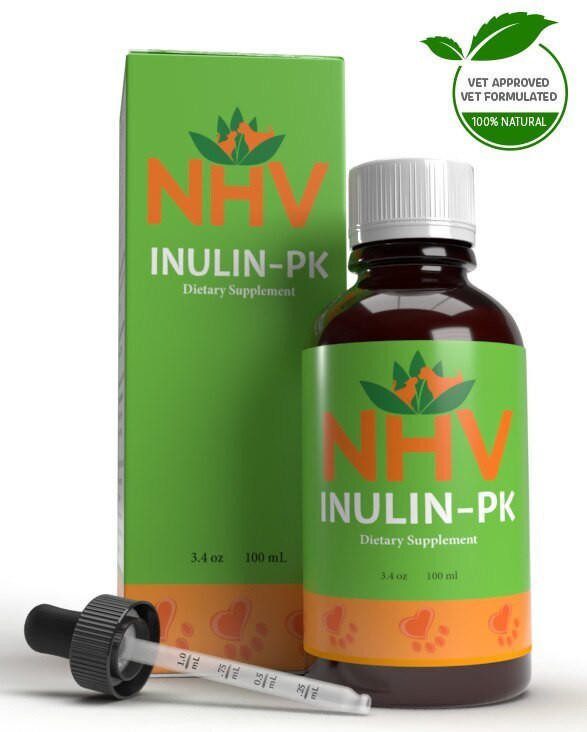
free shipping over $100 (USA & Canada)
1-877-937-4372 the pet expert hotline
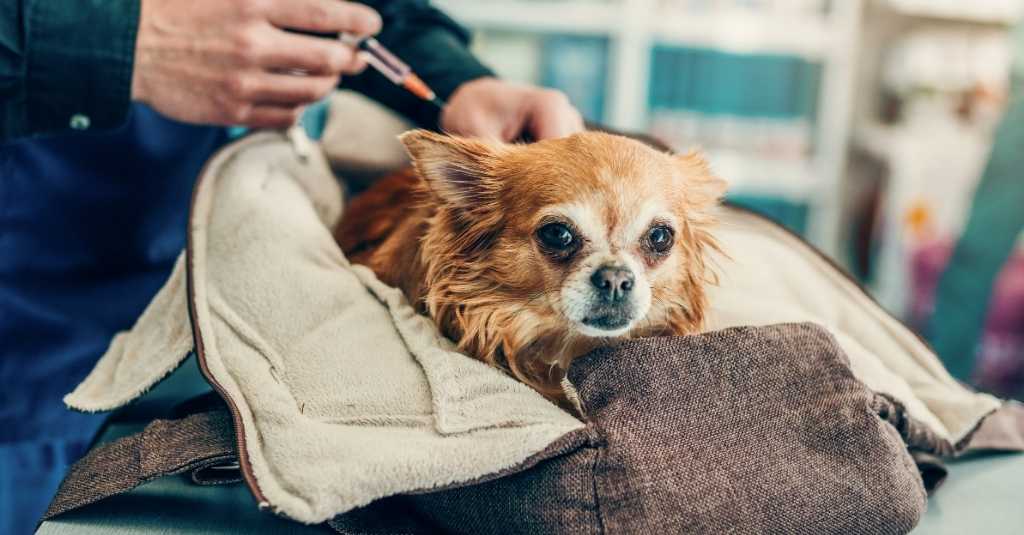
As fun and exciting as it is to get a new furbaby, it can sometimes it can be overwhelming to get a new pet. Choosing what kind of pet we would like to adopt, researching everything we can about a dog breed, or cat behavior, are just a few things to keep in mind. We receive a lot of information and sometimes we need expert advice to help us and teach us how to take proper care of a new beloved companion, especially when it comes to the vaccines that you must get for your cat and dog.
Veterinarians use vaccines to help stimulate the immune system to produce antibodies.
One of the main things that we need to know when adopting a new pet is how to keep them healthy. For that, a veterinarian would say: give good food, exercise and play with your pet, and give the correct vaccines.
Veterinarians use vaccines to help stimulate the immune system to produce antibodies. With antibodies, puppies and kitties will be able to prevent certain infections or fight them if they happen.
There are two types of vaccines. Core vaccines, mean the types of vaccines that are essential for dogs and cats. Non-core vaccines, mean the ones that are only suggested for animals that have higher risks of infection. It is important to discuss the vaccine protocol with your veterinarian before starting it. This way you will know what type of vaccines your fur baby is getting and what is the schedule.
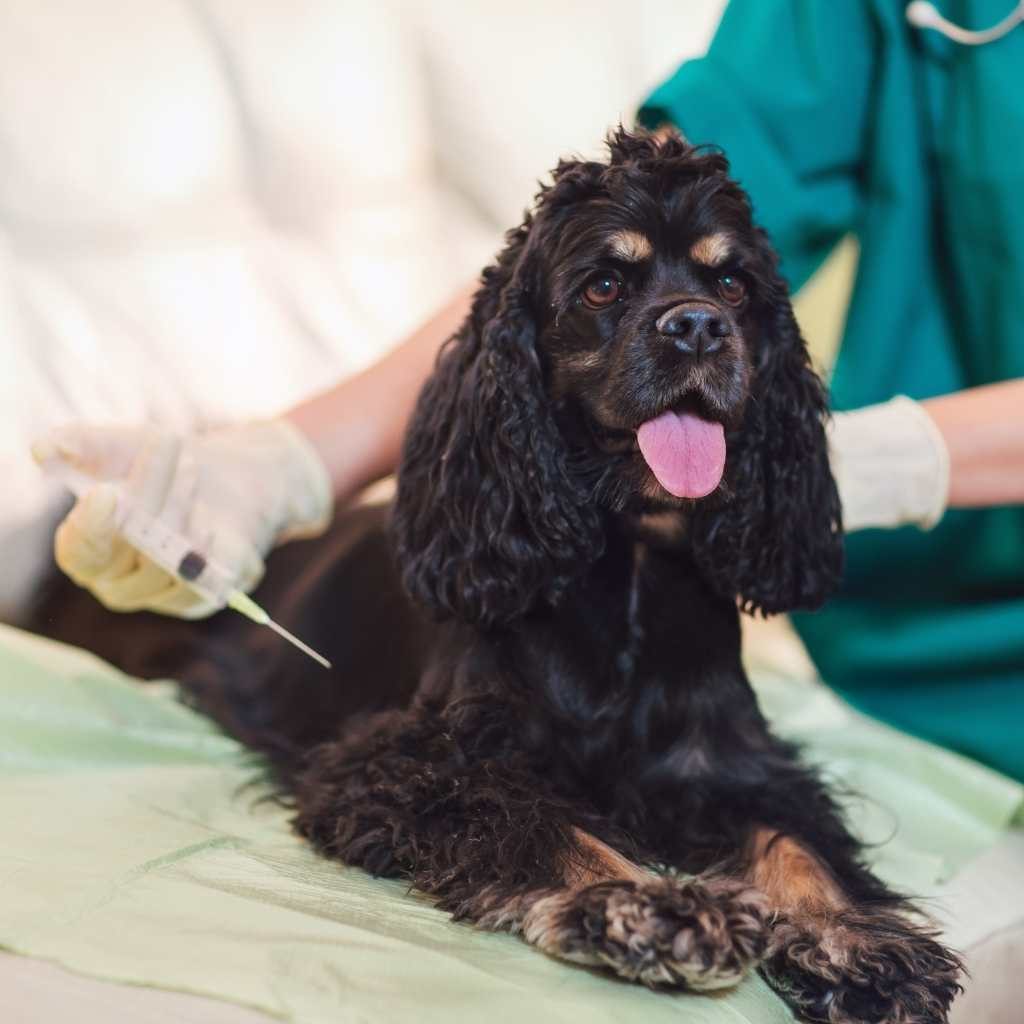
Pups are adorable. Their little fluffy faces, their smell (not the poop smell, though), and the way they play and explore the new world around them. Everything is exciting about a puppy. Simply adorable. Sometimes they act tough, learning how to bark, growl and playing tug, but since their system is in development, their immune system is fragile and needs our help to grow strong and be healthy.
These are the three main diseases that infect dogs, especially the elderly and puppies. If left untreated, they are often fatal. Even treatments for these conditions are difficult and often fatal. If the puppy survives, it is common to have permanent neurological damage.
Vomiting, diarrhea, discoordination, muscle paralysis, lethargy, appetite loss, seizures are some of the symptoms that your puppy can show when they are infected. They can contract these diseases by using an infected dog’s bowl or coming into contact with contaminated feces, nasal discharge, or urine.
The best way to prevent these diseases is to vaccinate your puppy. The protocol follows with 3 doses of each vaccine, often given in the same set of shots.
The first shot must be given when the puppy is 6-8 weeks old. That is when the maternal antibodies start to decrease levels in the puppy’s body and the vaccine will start to stimulate the immune system.
A second shot must be given after 3-4 weeks when the puppy is 9-12 weeks old. A third shot when the puppy is 13-16 weeks old. That is when the maternal antibodies are almost nonexistent, and the vaccine is most effective to stimulate the immune system. After the third shot, your veterinarian will assess and decide if a booster must be given yearly or every 2-3 years. This decision might be affected by the incidence of these diseases in your country or region.
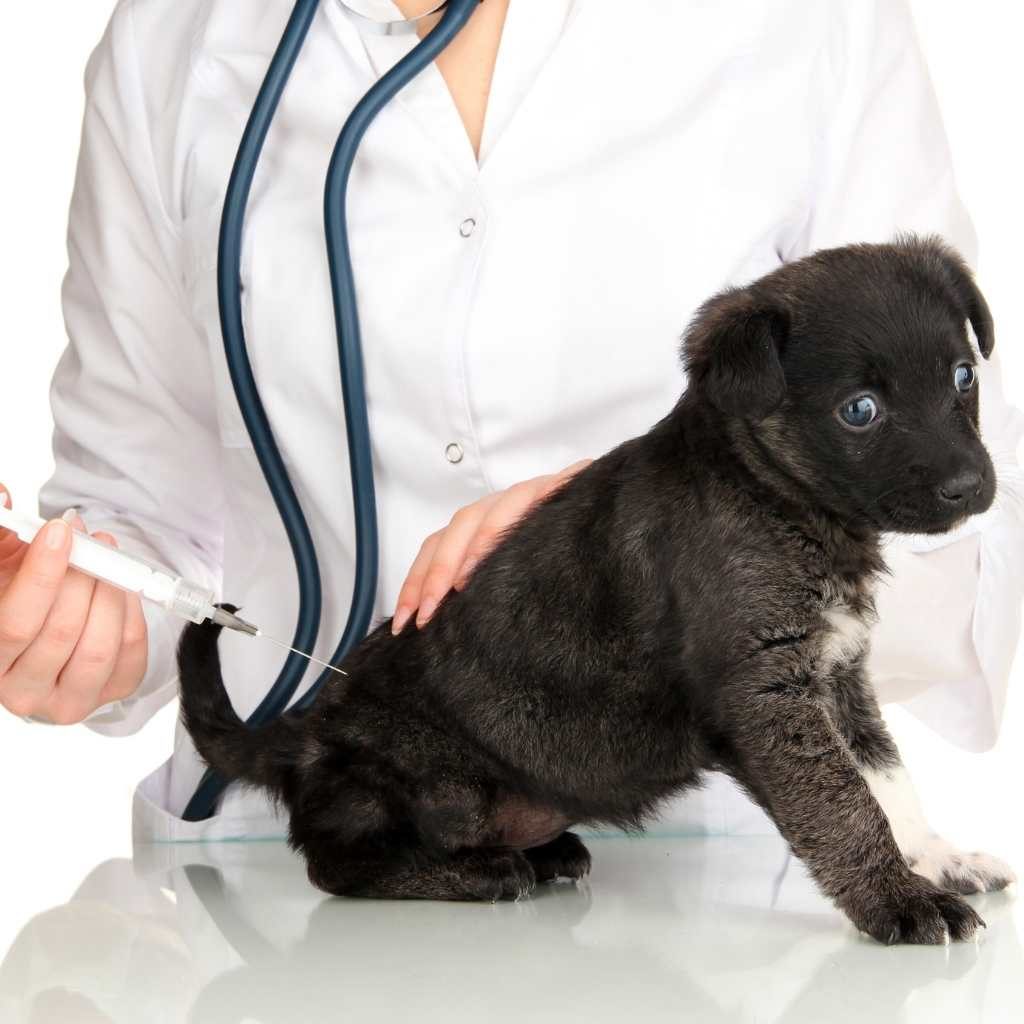
This is a very serious and fatal disease that attacks the nervous system and can be spread from animals to humans. Rabies can be contracted when an infected animal bites another or when an infected animal bites a human.
Note: a human will not contract rabies if a non-infected animal bites them. The infection only happens if the animal is infected by the rabies virus. Symptoms are extreme foaming, hydrophobia, and extreme aggression without a reason. Rabies is fatal in mammals in general, and the vaccine is considered mandatory.
All dogs must be rabies vaccinated when they are 12-16 weeks old. This vaccine is usually given with the third shot of distemper, parvovirus, and adenovirus. For a booster, the veterinarian can decide on the 1-year or 3-year booster, depending on how controlled the rabies infection is in your country or region and the type of rabies vaccine given to your puppy for the first time.
Parainfluenza, Measles, Bordetella, Lyme disease, Canine Coronavirus (CCV which is different from COVID-19 seen in humans), Giardia, and Leptospirosis are some of the non-core vaccines. Veterinarians will suggest them depending on your dog’s lifestyle, breed, and risks the region you live offers.
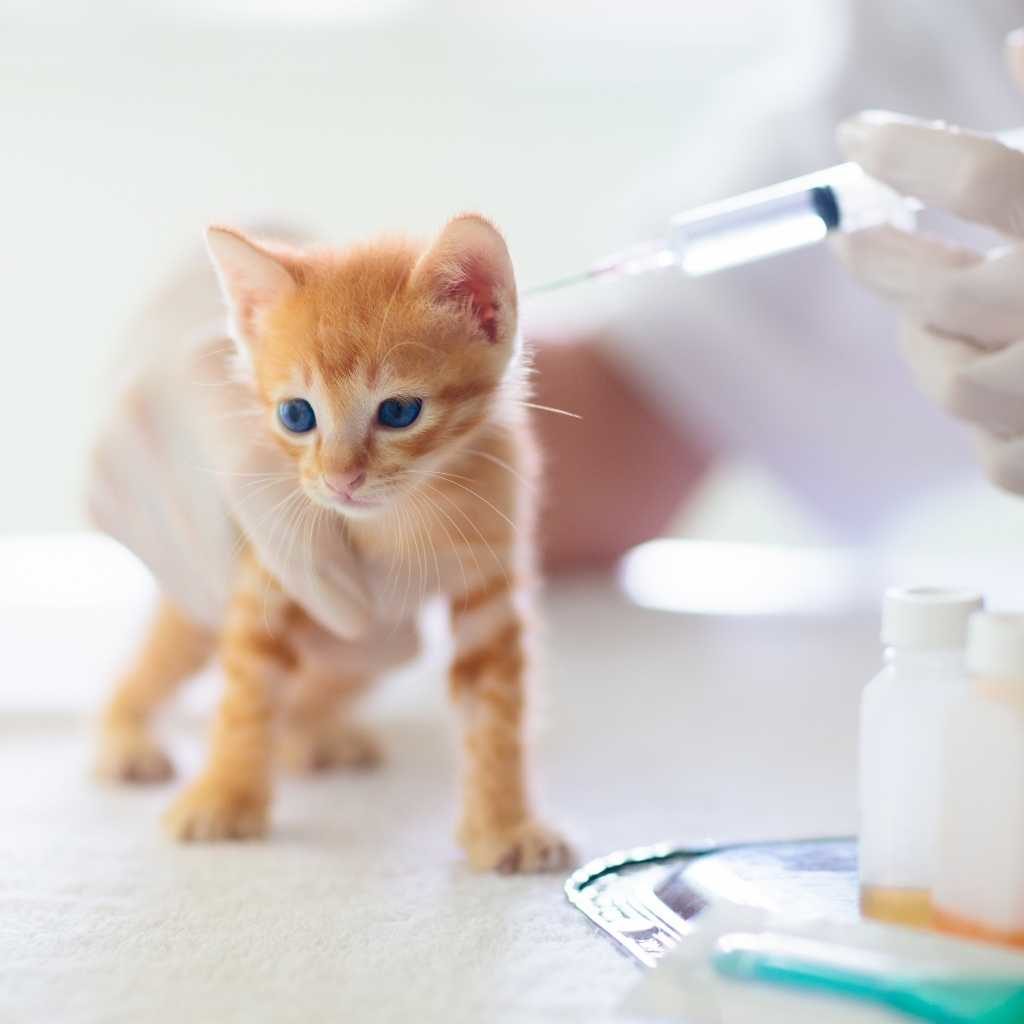
Who can resist that cute meow of a kitty? No one! These little furbabies are the cutest and most adorable, fierce, and brave creatures. Just the same as for dogs, kitties need vaccines to stimulate the immune system to develop healthy and strong.
FPV and Feline Calicivirus are the main and most severe diseases that infect cats. They are highly transmissible and often fatal if left untreated.
Symptoms can include diarrhea, vomiting, neurological symptoms, nasal and eye discharge. They can easily contract the diseases from other infected felines, contaminated water, and food bowls, and discharge from other infected felines.
And just like puppies, the vaccine protocol follows three doses of each vaccine, often given in the same set of shots. The first shot must be given when the kitten is 6-8 weeks old, then at 9-12 weeks old for the second dose, and the third dose when they are 13-16 weeks old. A booster shot must be given every year during the adult life of your cat.
Cats experience the same symptoms as dogs and the transmission happens the same way, from an infected animal bite. Infected cats can transmit rabies to humans. Rabies is fatal in mammals in general, and the vaccine is considered mandatory.
Rabies vaccine protocol also follows the same as for dogs, and cats get the shot at 13-16 weeks old, usually with the third shot of Feline Panleukopenia and Feline Calicivirus. A booster is to be decided by the veterinarian, according to what type of rabies shot your cat had and where you live.
Feline immunodeficiency virus (FIV), Feline leukemia (FeLV), Bordetella, and Chlamydia are often suggested if your region offers a higher infection risk, or if you have an outdoor cat. Two other non-core vaccines for cats are Feline Infectious Peritonitis and Giardia, but the effectiveness of these vaccines is still debatable.
Like all vaccines, even in humans, reactions can be local discomfort and swelling, lethargy for a day or two, even fever in more extreme cases. If you notice any of these reactions, you should take your pet to a veterinarian.
If you are concerned about a vaccination, talk to your veterinarian about a titer test. This is a blood sample that will be sent to specialized labs to exam for an acceptable immune response to diseases like panleukopenia and calicivirus in cats. A rabies titer test can also be performed for the same purpose. If the immune response is satisfactory, another set of vaccines might not be required at the moment.
After your puppy or kitten has been fully vaccinated, you can begin using NHV supplements to help keep your pup or kitty healthy and supported. The NHV Puppy and Kitten Starter Kit is great to have on hand. The bundle contains all the essentials:
PetOmega 3—omega 3 fatty acids are hugely beneficial to help keep your pet healthy and their immune system supported.
Plantaeris—helps relieve diarrhea and helps reduce digestive discomfort. Plantaeris can be used on a short-term or long-term basis.
Inulin PK—is a natural dewormer that helps eliminate parasites and promotes healing from parasite related damage.
Multi Essentials—is a blend of herbs high in minerals and vitamins to add an extra dose of nutrition to their regimen.
First Aid Spray—to help heal and clean minor scratches and wounds.
If you ever have questions or concerns about vaccinations for your pet, our pet experts are here to help! Reach out to us by email or our social channels with your questions.
parasite support

Natural Parasite Dewormer for Cats and Kittens
buy 2 and save $3
3 month supply for a small to medium size pet
Gently destroy parasite infestations with a natural cat dewormer while helping repair damage caused by worms and balancing the immune system.

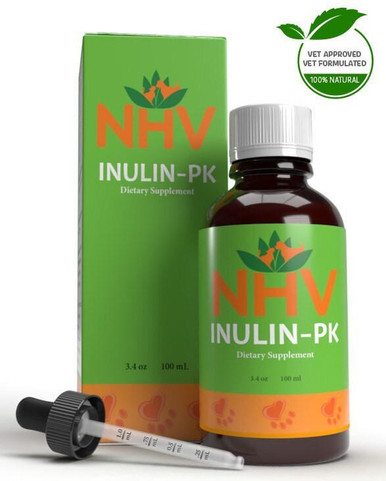
Gently destroy parasite infestations with a natural cat dewormer while helping repair damage caused by worms and balancing the immune system.

Rid your cat of internal parasites (worms) that can drain your pet’s energy, prevent them from absorbing nutrients from food, and damage the intestinal tract. Inulin PK is a natural cat dewormer designed to control parasites in cats, stop bleeding, and repair the internal damage worms cause.
Common types of worms that Inulin-PK can help support recovery from include hookworm, roundworm, whipworm, and tapeworm. The signs that your pet may be infected include anemia, weight loss, and diarrhea. We recommend first seeing your veterinarian for a diagnosis.
NHV supplements are all-natural herbal remedies that can be safely taken alongside conventional treatment.
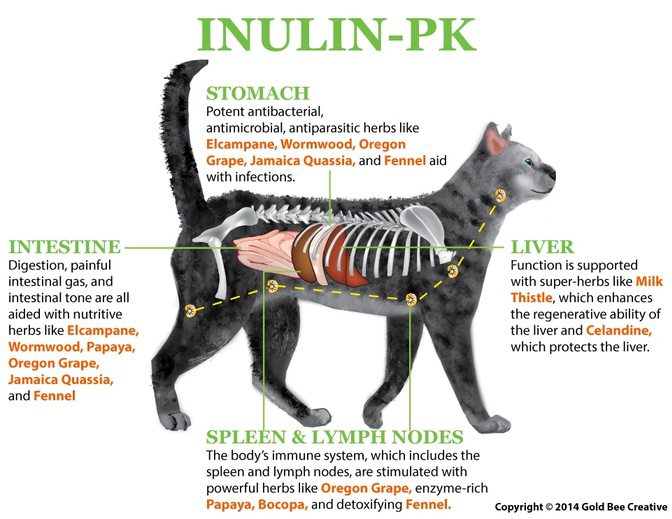
Elecampane – Has a paralyzing effect on the central nervous system of worms.
Wormwood – Expels intestinal worms and parasite infestations.
Jamaica Quassia – Helps expel parasitic worms from the body. Enhances other properties in Inulin PK.
Papaya – Helps dissolve the worm’s outer layer.
Oregon Grape – Helps relieve indigestion and malabsorption. It also has antibiotic and immunostimulatory properties.
Fennel – Relieves digestive problems and relaxes spasms.
Bacopa – Clears toxins, reduces inflammation, and improves healing.
Milk Thistle – Protects, strengthens, and stimulates new cell production in the liver.
Celandine – Protects the liver, improves bile flow, and helps to emulsify gallbladder content.
Select your pet's weight to determine the correct dose.
To be taken twice daily. Determine your pet’s weight and then use the easy chart below to determine the correct dose. This is the minimum dosage.
Pet's Weight Dosage
0 - 15 lb = 0.5 ml
16 - 30 lb = 1.0 ml
31 - 45 lb = 1.5 ml
46 - 60 lb = 2.0 ml
61 - 75 lb = 2.5 ml
Over 75 lb = 3.0 ml
How to Administer:
Shake well before use. The easiest method is to use the dropper provided and place the drops into your pet’s food or favorite treat. You can also use the dropper and squirt directly into the pet’s mouth. Some pets can be finicky, if this occurs consider hiding the drops in foods most pet’s love such as fish, chicken or yogurt or a favorite treat. If your pet only eats dry food then soak a few kibbles at feeding time.
For Best Results
Herbal dietary supplements are beneficial to the health and well-being of your pet and are safe for long-term use. Every pet responds to natural herbal supplements differently, therefore it is important to be consistent and administer the product daily. Supplements generally take two to four weeks to take effect, however this will vary from one animal to the next.
Product Storage
All NHV Natural Pet Products are pure herbal extracts and contain no artificial additives, preservatives or coloring. Shelf life after opening is 6 months and must be refrigerated after opening.
Cautions and Contraindications
Do not use Inulin PK in pregnant animals.
Speak to your vet before using our products. A second visit is recommended if your pet’s condition does not improve, or deteriorates after continued use of the supplements.
All information provided by NHV Natural Pet Products is for educational purposes only.
Rid your cat of internal parasites (worms) that can drain your pet’s energy, prevent them from absorbing nutrients from food, and damage the intestinal tract. Inulin PK is a natural cat dewormer designed to control parasites in cats, stop bleeding, and repair the internal damage worms cause.
Common types of worms that Inulin-PK can help support recovery from include hookworm, roundworm, whipworm, and tapeworm. The signs that your pet may be infected include anemia, weight loss, and diarrhea. We recommend first seeing your veterinarian for a diagnosis.
NHV supplements are all-natural herbal remedies that can be safely taken alongside conventional treatment.

Elecampane – Has a paralyzing effect on the central nervous system of worms.
Wormwood – Expels intestinal worms and parasite infestations.
Jamaica Quassia – Helps expel parasitic worms from the body. Enhances other properties in Inulin PK.
Papaya – Helps dissolve the worm’s outer layer.
Oregon Grape – Helps relieve indigestion and malabsorption. It also has antibiotic and immunostimulatory properties.
Fennel – Relieves digestive problems and relaxes spasms.
Bacopa – Clears toxins, reduces inflammation, and improves healing.
Milk Thistle – Protects, strengthens, and stimulates new cell production in the liver.
Celandine – Protects the liver, improves bile flow, and helps to emulsify gallbladder content.
Select your pet's weight to determine the correct dose.
To be taken twice daily. Determine your pet’s weight and then use the easy chart below to determine the correct dose. This is the minimum dosage.
Pet's Weight Dosage
0 - 15 lb = 0.5 ml
16 - 30 lb = 1.0 ml
31 - 45 lb = 1.5 ml
46 - 60 lb = 2.0 ml
61 - 75 lb = 2.5 ml
Over 75 lb = 3.0 ml
How to Administer:
Shake well before use. The easiest method is to use the dropper provided and place the drops into your pet’s food or favorite treat. You can also use the dropper and squirt directly into the pet’s mouth. Some pets can be finicky, if this occurs consider hiding the drops in foods most pet’s love such as fish, chicken or yogurt or a favorite treat. If your pet only eats dry food then soak a few kibbles at feeding time.
For Best Results
Herbal dietary supplements are beneficial to the health and well-being of your pet and are safe for long-term use. Every pet responds to natural herbal supplements differently, therefore it is important to be consistent and administer the product daily. Supplements generally take two to four weeks to take effect, however this will vary from one animal to the next.
Product Storage
All NHV Natural Pet Products are pure herbal extracts and contain no artificial additives, preservatives or coloring. Shelf life after opening is 6 months and must be refrigerated after opening.
Cautions and Contraindications
Do not use Inulin PK in pregnant animals.
Speak to your vet before using our products. A second visit is recommended if your pet’s condition does not improve, or deteriorates after continued use of the supplements.
All information provided by NHV Natural Pet Products is for educational purposes only.
multivitamin support
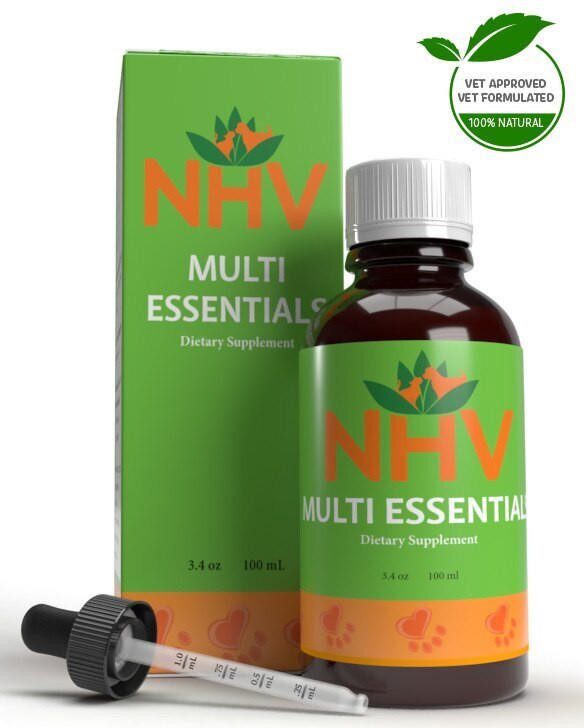
Herbal Digestive Aid, Energy Booster, and Multivitamin for Cats
buy 2 and save $3
3 month supply for a small to medium size pet
These multivitamins for cats will ensure your kitty (of any age) is getting an extra dose of minerals and vitamins for extra energy, vitality, and health.

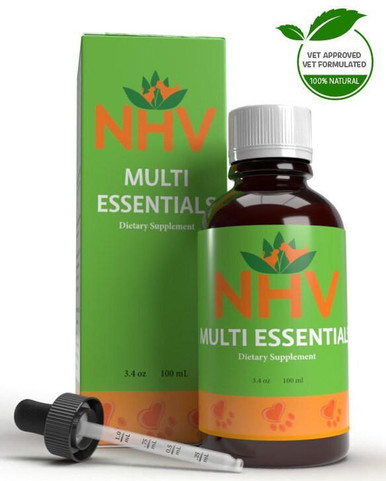
These multivitamins for cats will ensure your kitty (of any age) is getting an extra dose of minerals and vitamins for extra energy, vitality, and health.

The health benefits of multivitamins aren’t just for humans. Cats have many of the same nutrient needs as we do, and some need even more than others depending on their age and health.
A multivitamin supplies the vital nutrients your kitty needs to be healthy and to fight off potential health problems. Dr. Cook, DVM, CVA in her blog states that vitamins “help to regulate the body processes, protect the body from environmental toxins, and break down nutrients such as carbohydrates, proteins, and fats so the body can utilize them”.
The best way to give your cat vitamins and minerals are from whole food sources and not just isolated synthetic vitamins. NHV Multi Essentials contains a powerful blend of alfalfa, oat, dandelion, kelp, parsley, marshmallow, chickweed, stinging nettle, Asian ginseng, yucca and Oregon grape.
Health Benefits of NHV’s Multi-Essentials for Cats
With NHV’s multi vitamins for cats, you get a proprietary blend of all-natural ingredients that are organically grown and contain no artificial additives, preservatives, or coloring. Some of the health benefits include:
Multivitamins for cats will ensure your kitty is getting the proper nutrients that could be lacking due to daily stressors, a poor diet, and environmental toxins.
Signs of Vitamin Deficiency in Your Cat
Kitties Who’ve Benefited from NHV Multi Essentials
NHV multi vitamin for cats has helped thousands of pets around the world. Here are just a few of their stories:
DEALING WITH DIGESTIVE ISSUES: MICI THE CAT LOVES HIS VITAMINS NHV MULTI ESSENTIALS
HERBAL MULTIVITAMINS AND TURMERIC HELP CATS, OATMEAL AND MELISSA LIVE HAPPIER
CAN CATS WITH FELV LIVE A HEALTHY AND NORMAL LIFE?
If you have questions regarding holistic support including vitamin supplements for cats, ask an NHV expert because, at NHV, we want your cat to feel clawtastic naturally!
Select your pet's weight to determine the correct dose.
To be taken twice daily. Determine your pet’s weight and then use the easy chart below to determine the correct dose. This is the minimum dosage.
Pet's Weight Dosage
0 - 15 lb = 0.5 ml
16 - 30 lb = 1.0 ml
31 - 45 lb = 1.5 ml
46 - 60 lb = 2.0 ml
61 - 75 lb = 2.5 ml
Over 75 lb = 3.0 ml
How to Administer
Shake well before use. The easiest method is to use the dropper provide and places the drops into your pet’s food or favorite treat. You can also use the dropper and squirt directly into the pet’s mouth.
Some pets can be finicky, if this occurs consider hiding the drops in foods most pet’s love such as fish, chicken or yogurt or a favorite treat. If your pet only eats dry food then soak a few kibbles at feeding time.
For Best Results
Herbal dietary supplements are beneficial to the health and wellbeing of your pet and are safe for long-term use. Every pet responds to natural herbal supplements differently, therefore it is important to be consistent and administer the product daily. Supplements generally take two to four weeks to take effect, however this will vary from one animal to the next.
Product Storage
All NHV Natural Pet Products are pure herbal extracts and contain no artificial additives, preservatives or coloring. Shelf life after opening is 6 months and must be refrigerated after opening.
Cautions and Contraindications
Do not use Multi Essentials in pregnant or nursing animals. Speak to your vet before using our products. A second visit is recommended if your pet’s condition does not improve, or deteriorates after continued use of the supplements.
All information provided by NHV Natural Pet Products is for educational purposes only.
The health benefits of multivitamins aren’t just for humans. Cats have many of the same nutrient needs as we do, and some need even more than others depending on their age and health.
A multivitamin supplies the vital nutrients your kitty needs to be healthy and to fight off potential health problems. Dr. Cook, DVM, CVA in her blog states that vitamins “help to regulate the body processes, protect the body from environmental toxins, and break down nutrients such as carbohydrates, proteins, and fats so the body can utilize them”.
The best way to give your cat vitamins and minerals are from whole food sources and not just isolated synthetic vitamins. NHV Multi Essentials contains a powerful blend of alfalfa, oat, dandelion, kelp, parsley, marshmallow, chickweed, stinging nettle, Asian ginseng, yucca and Oregon grape.
Health Benefits of NHV’s Multi-Essentials for Cats
With NHV’s multi vitamins for cats, you get a proprietary blend of all-natural ingredients that are organically grown and contain no artificial additives, preservatives, or coloring. Some of the health benefits include:
Multivitamins for cats will ensure your kitty is getting the proper nutrients that could be lacking due to daily stressors, a poor diet, and environmental toxins.
Signs of Vitamin Deficiency in Your Cat
Kitties Who’ve Benefited from NHV Multi Essentials
NHV multi vitamin for cats has helped thousands of pets around the world. Here are just a few of their stories:
DEALING WITH DIGESTIVE ISSUES: MICI THE CAT LOVES HIS VITAMINS NHV MULTI ESSENTIALS
HERBAL MULTIVITAMINS AND TURMERIC HELP CATS, OATMEAL AND MELISSA LIVE HAPPIER
CAN CATS WITH FELV LIVE A HEALTHY AND NORMAL LIFE?
If you have questions regarding holistic support including vitamin supplements for cats, ask an NHV expert because, at NHV, we want your cat to feel clawtastic naturally!
Select your pet's weight to determine the correct dose.
To be taken twice daily. Determine your pet’s weight and then use the easy chart below to determine the correct dose. This is the minimum dosage.
Pet's Weight Dosage
0 - 15 lb = 0.5 ml
16 - 30 lb = 1.0 ml
31 - 45 lb = 1.5 ml
46 - 60 lb = 2.0 ml
61 - 75 lb = 2.5 ml
Over 75 lb = 3.0 ml
How to Administer
Shake well before use. The easiest method is to use the dropper provide and places the drops into your pet’s food or favorite treat. You can also use the dropper and squirt directly into the pet’s mouth.
Some pets can be finicky, if this occurs consider hiding the drops in foods most pet’s love such as fish, chicken or yogurt or a favorite treat. If your pet only eats dry food then soak a few kibbles at feeding time.
For Best Results
Herbal dietary supplements are beneficial to the health and wellbeing of your pet and are safe for long-term use. Every pet responds to natural herbal supplements differently, therefore it is important to be consistent and administer the product daily. Supplements generally take two to four weeks to take effect, however this will vary from one animal to the next.
Product Storage
All NHV Natural Pet Products are pure herbal extracts and contain no artificial additives, preservatives or coloring. Shelf life after opening is 6 months and must be refrigerated after opening.
Cautions and Contraindications
Do not use Multi Essentials in pregnant or nursing animals. Speak to your vet before using our products. A second visit is recommended if your pet’s condition does not improve, or deteriorates after continued use of the supplements.
All information provided by NHV Natural Pet Products is for educational purposes only.
diarrhea support
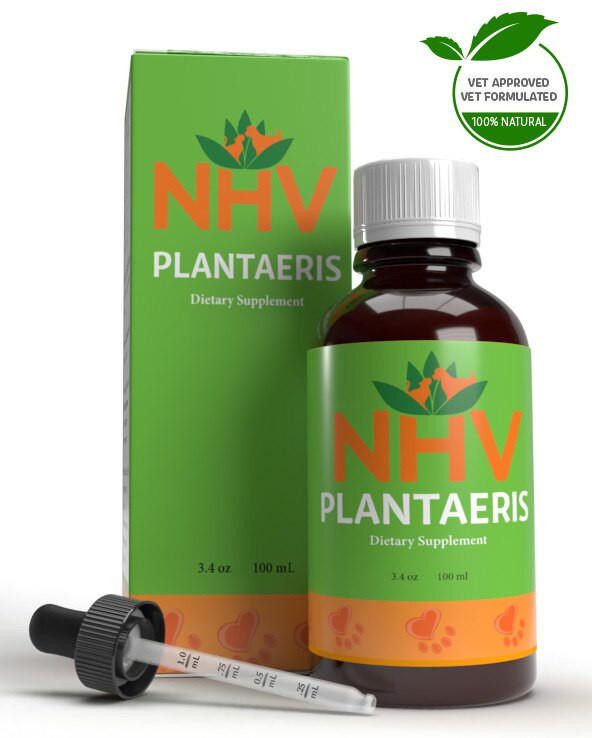
Natural Relief for Diarrhea and Inflammatory Bowel Disease (IBD)
buy 2 and save $3
3 month supply for a small to medium size pet
Plantaeris is a natural dog diarrhea remedy that works quickly and gently to support the relief of digestive disorders and the associated symptoms.

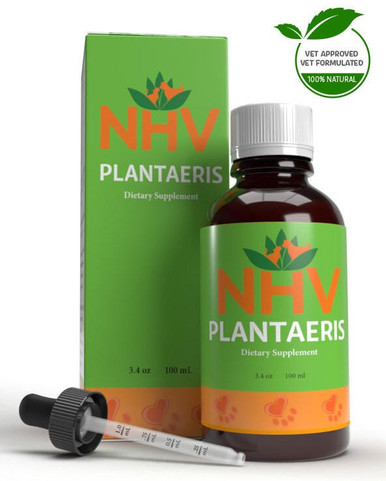
Plantaeris is a natural dog diarrhea remedy that works quickly and gently to support the relief of digestive disorders and the associated symptoms.

Reduce intestinal upset and diarrhea with Plantaeris, a fast-acting, gentle, herbal, natural dog diarrhea remedy that will help your pet feel better in no time. Plantaeris is designed to help reduce symptoms of diarrhea.
Diarrhea is a symptom of digestive disorders. In dogs, it can be caused by inflammatory bowel disease, food allergies, or parasites such as giardia. Help your pet with Plantaeris dog diarrhea supplement and ensure they have plenty of fluids to prevent dehydration.
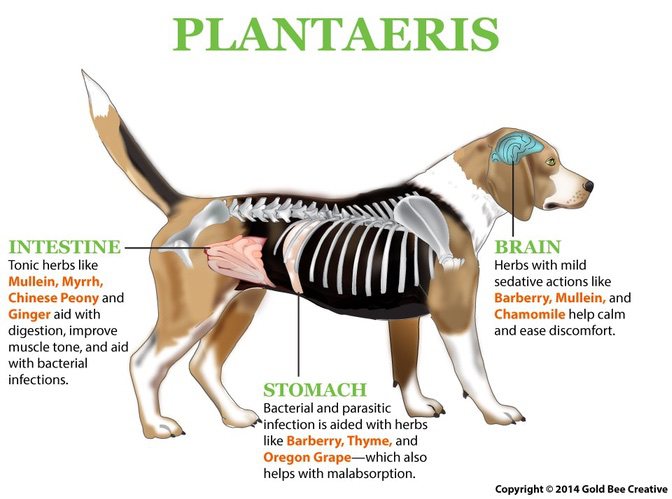
Barberry – Treats inflammation and infections.
Mullein – Soothes and lubricates the tissues of the GI tract.
Bayberry – Contains tannins, resins, and gums that control bacterial infection.
Myrrh – Relieves spasms, inflammation, and digestive discomfort.
Thyme – Improves digestion and relaxes GI spasms.
Chamomile – Relaxes the digestive system.
Chinese Peony – Reduces inflammation and relaxes spasms.
Ginger – Relieves discomfort and stimulates circulation.
Oregon Grape – Helps relieve indigestion and malabsorption.
Select your pet's weight to determine the correct dose.
To be taken twice daily. Determine your pet’s weight and then use the easy chart below to determine the correct dose. This is the minimum dosage.
Pet's Weight Dosage
0 - 15 lb = 0.5 ml
16 - 30 lb = 1.0 ml
31 - 45 lb = 1.5 ml
46 - 60 lb = 2.0 ml
61 - 75 lb = 2.5 ml
Over 75 lb = 3.0 ml
How to Administer
Shake well before use. The easiest method is to use the dropper provide and places the drops into your pet’s food or favorite treat. You can also use the dropper and squirt directly into the pet’s mouth.
Some pets can be finicky, if this occurs consider hiding the drops in foods most pet’s love such as fish, chicken or yogurt or a favorite treat. If your pet only eats dry food then soak a few kibbles at feeding time.
For Best Results
Herbal dietary supplements are beneficial to the health and wellbeing of your pet and are safe for long-term use. Every pet responds to natural herbal supplements differently, therefore it is important to be consistent and administer the product daily. Supplements generally take two to four weeks to take effect, however this will vary from one animal to the next.
Product Storage
All NHV Natural Pet Products are pure herbal extracts and contain no artificial additives, preservatives or coloring. Shelf life after opening is 6 months and must be refrigerated after opening.
Cautions and Contraindications
Do not use Plantaeris in pregnant or nursing animals. Speak to your vet before using our products. A second visit is recommended if your pet’s condition does not improve, or deteriorates after continued use of the supplements.
All information provided by NHV Natural Pet Products is for educational purposes only.
Reduce intestinal upset and diarrhea with Plantaeris, a fast-acting, gentle, herbal, natural dog diarrhea remedy that will help your pet feel better in no time. Plantaeris is designed to help reduce symptoms of diarrhea.
Diarrhea is a symptom of digestive disorders. In dogs, it can be caused by inflammatory bowel disease, food allergies, or parasites such as giardia. Help your pet with Plantaeris dog diarrhea supplement and ensure they have plenty of fluids to prevent dehydration.

Barberry – Treats inflammation and infections.
Mullein – Soothes and lubricates the tissues of the GI tract.
Bayberry – Contains tannins, resins, and gums that control bacterial infection.
Myrrh – Relieves spasms, inflammation, and digestive discomfort.
Thyme – Improves digestion and relaxes GI spasms.
Chamomile – Relaxes the digestive system.
Chinese Peony – Reduces inflammation and relaxes spasms.
Ginger – Relieves discomfort and stimulates circulation.
Oregon Grape – Helps relieve indigestion and malabsorption.
Select your pet's weight to determine the correct dose.
To be taken twice daily. Determine your pet’s weight and then use the easy chart below to determine the correct dose. This is the minimum dosage.
Pet's Weight Dosage
0 - 15 lb = 0.5 ml
16 - 30 lb = 1.0 ml
31 - 45 lb = 1.5 ml
46 - 60 lb = 2.0 ml
61 - 75 lb = 2.5 ml
Over 75 lb = 3.0 ml
How to Administer
Shake well before use. The easiest method is to use the dropper provide and places the drops into your pet’s food or favorite treat. You can also use the dropper and squirt directly into the pet’s mouth.
Some pets can be finicky, if this occurs consider hiding the drops in foods most pet’s love such as fish, chicken or yogurt or a favorite treat. If your pet only eats dry food then soak a few kibbles at feeding time.
For Best Results
Herbal dietary supplements are beneficial to the health and wellbeing of your pet and are safe for long-term use. Every pet responds to natural herbal supplements differently, therefore it is important to be consistent and administer the product daily. Supplements generally take two to four weeks to take effect, however this will vary from one animal to the next.
Product Storage
All NHV Natural Pet Products are pure herbal extracts and contain no artificial additives, preservatives or coloring. Shelf life after opening is 6 months and must be refrigerated after opening.
Cautions and Contraindications
Do not use Plantaeris in pregnant or nursing animals. Speak to your vet before using our products. A second visit is recommended if your pet’s condition does not improve, or deteriorates after continued use of the supplements.
All information provided by NHV Natural Pet Products is for educational purposes only.
Published: December 30, 2020